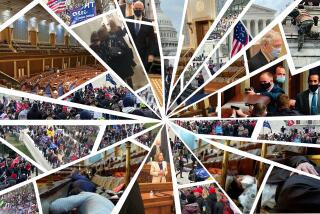Protesters Rampage in Azerbaijan : Politics: Angry demonstrators reportedly topple president who rebuffed their demands that he quit.
MOSCOW — Outraged by the restoration of President Ayaz Mutalibov to power, thousands of Azerbaijanis braved gunfire on Friday to storm the country’s Parliament and presidential palace after the former Communist ignored their demand that he resign.
In what seemed like a carbon copy of recent events in another former Soviet republic, Tajikistan, demonstrators opposing Mutalibov had taken over the broadcast center and other vital government facilities in Baku, Azerbaijan’s capital, by dusk, and the president’s whereabouts were a mystery.
On a visit to Turkey, Etibar Mamedov, leader of the opposition Party of National Independence, told reporters that Mutalibov had been overthrown by a “people’s uprising” and said a new government in the oil-rich republic on the Caspian Sea would be formed within two days.
Mutalibov, Azerbaijan’s erstwhile Communist Party first secretary, had resigned his presidential post under pressure in March after die-hard nationalists charged that he had failed to prevent an Armenian attack on the city of Khojaly in Nagorno-Karabakh--a predominantly Armenian enclave within Azerbaijan--an attack that Azerbaijanis claimed led to the massacre of up to 1,000 of their countrymen.
Ironically, it was yet another Azerbaijani debacle in the fight for the territory--the loss of the key town of Shusha last week--that prompted the Azerbaijani Parliament on Thursday to vote to restore the 53-year-old Mutalibov to office.
He immediately declared a state of emergency, suspended the activities of political parties, imposed government censorship and a curfew and banned demonstrations and strikes in his Transcaucasian country.
Voicing their outrage over Mutalibov’s “ coup d’etat ,” members of the grass-roots nationalist Azerbaijani Popular Front and sympathizers massed by the thousands in Baku on Friday morning to demand that the president resign immediately.
They began marching on the presidential residence about 3:30 p.m., but shifted course toward the Parliament building, located on the shore of the Caspian.
The local Assa-Irada news agency said the demonstrators were supported by a military force that included four armored personnel carriers, an antiaircraft gun and two truckloads of men in camouflage uniforms with guns.
The marchers carried signs saying “Down With the Coup Leaders!” “Democracy, Freedom, Independence!” and “Armenian Aggression is the Result of Russian Policy!” according to reports from Baku.
The Popular Front estimated the protesters’ numbers at half a million; an Azerbaijani diplomat in Moscow said they were no more than “a few thousand.”
As the column approached Parliament, pro-Mutalibov forces who were deployed in a hotel across the street and on the roof of the former KGB headquarters opened fire, touching off a sporadic gun battle that lasted 45 minutes and sent machine-gun rounds ripping through a nearby park.
Popular Front spokesmen said that 10 to 20 people were struck by bullets but that no one was killed. Refusing to be routed by the gunfire, the opposition swarmed into Parliament and hoisted a large Azerbaijani flag atop the glass-and-concrete building.
The protesters seized the presidential palace about 8 p.m., after warning Mutalibov’s aides and Azerbaijani military officials to leave. Fahmin Gadjiyev, a Popular Front leader and the deputy military commandant of Azerbaijan, said in a television appearance that all vital sites in Baku, including the studios of state-run radio and TV, were occupied by forces opposed to Mutalibov by early evening.
Popular Front leaders reported that the newly restored president was in flight somewhere outside Baku, but that could not be confirmed. It was only one of the eerie parallels with events last week in Tajikistan, where the president, also a former Communist hard-liner, was forced by a hostile mob to flee his residence. The two sides later hammered out a power-sharing agreement.
In Washington, State Department spokeswoman Margaret Tutwiler said the Bush Administration “is deeply concerned” about Azerbaijan’s political instability.
“We believe the most effective means of restoring stability is through free elections that will allow the Azerbaijani people to express their own political choices,” she said. “We urge the Azerbaijani government to reschedule the presidential election as soon as possible.”
She also urged the government to lift curfew, censorship and other emergency restrictions that have been imposed by the government.
Azerbaijani Popular Front officials appearing on television justified their actions by saying they had been bound to restore constitutional rule in Azerbaijan, but they seemed to have no clear-cut plan for what should come next. They demanded instead that an emergency parliamentary session be called to determine the “fate of the country.”
Niyazi Ibragimov, a spokesman, said the Popular Front aims to build a democratic society granting equal rights to all citizens, regardless of ethnic background, faith or political views. But the front is viewed as much more implacable than Mutalibov on the need to crush resistance in Nagorno-Karabakh, which has been struggling for the past four years to break away from Azerbaijan.
Times staff writer Norman Kempster in Washington contributed to this article.
More to Read
Sign up for Essential California
The most important California stories and recommendations in your inbox every morning.
You may occasionally receive promotional content from the Los Angeles Times.










